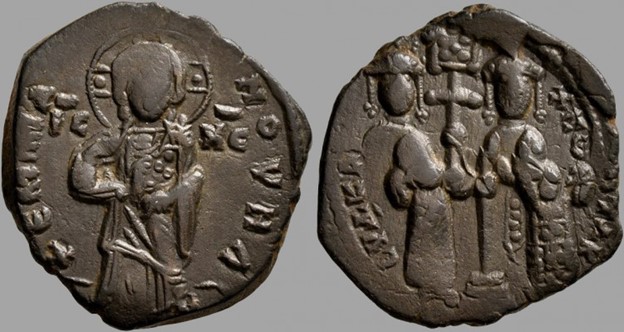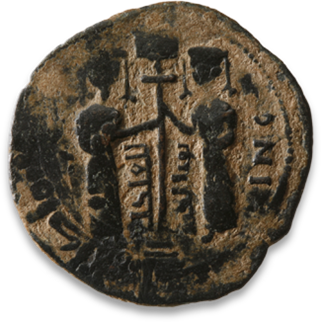Map of the Eastern Mediterranean, 12th Century

Zangi in Edessa
The departure of the ruler Zangī from Edessa:
Zangī came to our churches of the Sūryoyē and observed their beauty. And he commanded that two great bells (zagge) should be given to them, so that they should be placed over them, as was the custom in the time of the Franks. Then he prepared to depart. And he commanded the Metropolitan and the people that they should be watchful in guarding the city, and they should not act deceitfully against his reign. And he departed from them on the Friday after Pentecost, and he went to Ḥārān.
Nur al-Din’s Minbar

A 12th-century Coin
Left: “Mahmud, King of the Princes”; Margin, possibly: [there is no god] “except God”
Right: “the Just, Light of the Faith [=Nur al-Din]”
An 11th-century Coin

The Ascension of Salah al-Din
The following passage is from William of Tyre. William of Tyre was born in the Holy Land and was, after a French education, appointed Archbishop of Tyre and Chancellor of the Kingdom of Jerusalem. He wrote in Latin towards the end of the twelfth century.
He [Shirkuh] occupied the Kingdom and went to the Caliph to pay his respects. He was received with many honors and granted the dignity and office of sultan. Thus he acquired power by the sword and seized all of Egypt for himself. . . . But the joy of his succession did not last long. He had scarcely held the reins for a year when he was removed from human affairs.
Shirkuh was succeeded by Saladin, the son of his brother, Najm-ad-Din. Saladin was a man of keen intelligence. He was vigorous in war and unusually generous. The first sign of the character of his rule came when he visited his lord, the Caliph, to Pay him the customary homage. It is said that when he entered he knocked the Caliph to the ground with a stick that he held in his hand and killed him. [note: William’s account of the Caliph’s death is not supported by other sources and it would appear that the Caliph Adid died a natural death on September 13, 1171, bringing the Fatimid caliphate to an end in Egypt.] He then put all of the Caliph’s children to the sword, so that he might be subject to no superior but might rule as both caliph and sultan. He was afraid, since the Turks were hated by the people, that sometime when he went to visit the Caliph, the Caliph might order his throat to be slit. He therefore anticipated the Caliph’s design and inflicted upon the unsuspecting Caliph the death which, it was said, the latter intended for him.
When the Caliph was dead, Saladin took possession of the royal wealth, the treasury, and all the assets of the Caliph’s house. With his excessive generosity, Saladin gave everything away to his soldiers, so that within a few days all the closets had been emptied and he was forced to borrow money. He thus placed himself heavily in debt to others.



